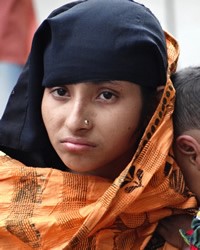Bengali, Sylheti in United Kingdom

Photo Source:
Adam Jones - Flickr
Creative Commons
|
Send Joshua Project a map of this people group.
|
| People Name: | Bengali, Sylheti |
| Country: | United Kingdom |
| 10/40 Window: | No |
| Population: | 125,000 |
| World Population: | 12,660,000 |
| Primary Language: | Sylheti |
| Primary Religion: | Islam |
| Christian Adherents: | 0.30 % |
| Evangelicals: | 0.04 % |
| Scripture: | New Testament |
| Ministry Resources: | Yes |
| Jesus Film: | Yes |
| Audio Recordings: | Yes |
| People Cluster: | South Asia Muslim - other |
| Affinity Bloc: | South Asian Peoples |
| Progress Level: |
|
Introduction / History
Sylhetti Bengalis are from what is now the upland areas of the Sylhet district in what is now northeastern Bangladesh. Their language, Sylhet, is either a dialect of Bengali or a different language altogether depending on whom you listen to.
Driven by poverty and drawn by ambition to see the world, many Sylhetti Bengali left Bangladesh and joined the English merchant fleet. When the ports of Kolkata, Mumbai, and Chittagong were established and the East India Company started to send ships to Bangladesh, the Sylhetti Bengali took jobs on ships as firemen.
Some Sylhetti sailors left the ships as early as 1920 and joined the small, but growing, community in eastern London. They often found jobs in the clothing trade or some branch of catering. Some worked in the boiler houses of large hotels, where they, as ex-firemen, found the suffocating atmosphere to be no problem.
During World War II they were vital to Great Britain's survival. After the war, they settled in various cities of the United Kingdom.
After the war, Bengali "coffee shops" began to spring up. This proved to be the initial step towards the first Sylhetti -owned Indian restaurants. By 1946, there were 20 such restaurants in London. This number grew to 300 in the United Kingdom by 1960 and over 3000 by 1980. The vast majority of these were owned by Indian families from Sylhet.
In the early 1950s, the London community of Sylhetti men was about 300. By 1962, the number had grown to 5,000. It was very common for the early immigrants to marry their English or Irish girlfriends, most of whom converted to Islam. After World War II, the first Sylhetti Bengali wives joined their husbands, and more have brought their families ever since.
The immigrants have established dynamic new communities in London, Birmingham, Glasgow, Cardiff, and Liverpool. Some of the pioneers flourished, particularly in the Indian restaurant business, others struggled, but only a few returned to Bangladesh. Their 100 year history in the UK paved the way for other Bengali peoples to migrate to that country.
What Are Their Lives Like?
Sylhetti Bengalis are known for their special kind of South Asian curry. It is very popular in the UK. Because of immigrant restrictions, many are closing because they can't get the chefs they need from Bangladesh. Other Sylhetti Bengalis have opened small shops, selling groceries and dry goods. They are in the process of getting better education, especially at the university level. The new generation of Sylhetti Bengalis is not content to continue the family business; they want to advance to higher economic levels.
Not all Sylhetti Bengalis are advancing at the same level. A high percentage of them are underemployed or unemployed.
What Are Their Beliefs?
Before the thirteenth century, the people of Sylhet had been Buddhist and Hindu, with a blend of traditional rituals. Later, the Sylhetti were introduced to Islam by Shah Jalal of Yemen, a Muslim holy man. They became Sufi Muslims (Muslim mystics who focused on meditation, devotional songs, and poetry) rather than orthodox Muslims.
After coming to the United Kingdom, early Sylhetti Bengali were negligent of their religious duties. However, after World War II, a new generation of more religious Sylhetti arrived. Many joined the political or religious organizations, clubs and leagues that began, mainly in London and Birmingham. The opening of a Muslim University in the UK increased the number of devout Sylhetti Bengali Muslims. It will be harder to win them to Christ than it was a generation ago.
What Are Their Needs?
Despite the abundance of Christians and churches in the United Kingdom, the Sylhetti Bengali remain virtually unreached with the gospel. Christians have been apathetic or fearful to witness to Muslims, and conversions have been few. Few Sylhetti in the UK have found their way to the cross. Bengali Muslim communities are highly organized and constantly press for legislation to favor Islam.
Prayer Points
Pray the Sylhetti Bengalis in the UK will have such a powerful hunger for truth that they will embrace Jesus Christ no matter what the cost.
Pray that Sylhetti Bengali will have radio broadcasts available in their own language.
Pray that God will give Sylhetti Bengali believers boldness to share Christ and disciple others in his ways.